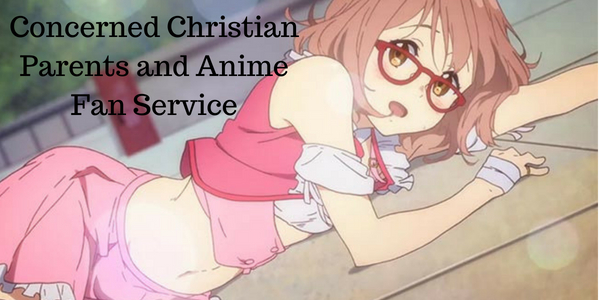
Recently, I’ve had questions from younger Christians who are conflicted about their obsession with anime and their Christian faith. Liking anime and being a Christian are not mutually exclusive. Yet, many Christians and Christian parents have more concerns surrounding anime than American media content. I’ve already addressed the sexual concerns surrounding anime, so I won’t go into much depth on them here.
Strangely, whenever parents tell me they refuse to let their children watch anime, they don’t see the contradiction with the movies they have in hand: usually violent American films. At the library, we often buy violent films, but we also avoid sexually-charged films. While the library shouldn’t show such bias, my community throws tantrums about sexual content. Violence, however, is okay. It’s perfectly fine to see people murder each other but a woman’s breast is taboo. Anime’s sexuality remains the sticking point. I’m not certain when violence became an accepted “Christian” norm.
However, some Christian anime fans have similar concerns despite knowing hentai isn’t all anime offers. Many are concerned about their emotional entanglement and how anime can dominate their thinking. Many suffer from after-anime sadness or depression, that empty, sad feeling that follows the ending of a story that resonated with you. The Bible states Christians need to remain focused on serving God. Jesus reminds us to keep our treasures in Heaven and not focus on riches in this life because our focus, our hearts, will be on what we value (Matthew 6:19-21). If we treasure moral character, learning, and striving to increase in love, our treasures are of the heavenly type. However, if wealth, power, violence, or even something more mundane like sports or anime, captures the majority of your focus, your heart will be there. Christian anime fans are right to be concerned, and its not like anime appears in the Bible. But Scripture does offer virtues to consider.

When addressing a letter sent to him by the Corinthian church, Paul rephrases the principle Jesus taught. The Corinthians were writing to Paul about various topics, including sexual immorality. In the letter they argued as Christians they are no longer under Jewish Law, that “All things are lawful for me.” Paul addresses the assessment simply: “but not all things are helpful”, “but I will not be dominated by anything.” (1 Cor. 6:11-13). Paul indirectly warns that a Christian shouldn’t be dominated, or mastered, by anything even if its okay in general. This restatement of Jesus’s treasures of the heart idea points to how wealth, sex, power, and, yes, even anime can dominate us.
Obsession happens when our thoughts and behavior are determined and defined by the object of our obsession. In the case of the Corinthians, it was sexual sins, including premarital sex. Paul states obsession or domination of an object is a problem because it prevents Christians from focusing on the development of the moral character Jesus exemplified. In fact, the core of Christianity centers on the development of moral character, or becoming like Christ. While we cannot be sinless, indeed we will often sin in the process, striving toward this moral character “faith shown by works” (James 2:18) is what being a Christian is about.

So with all of that in mind, can a Christian be an otaku? An otaku is someone who obsesses over something, be it trains, pop idols, or, as we in the West consider it, anime. Of course, the term has a softer meaning online. Many people who just like to watch anime call themselves otaku because that is what anime watchers identify as online. We have a strange idea that everything has to have an identity label. It creates a sort of tribal belonging even if there is a wide range within that label. Otaku can encompass casual anime watchers all the way to the hardcore fanatics who collect figures, watch nothing but anime, behave poorly (often labeled as weeaboo), and otherwise have their identity enmeshed with anime.
So it depends on where you are on the otaku spectrum. If you are on the obsessive side, you’ve placed your treasures in anime and the online culture. You’ve allowed anime to dominate you. On the other hand, if you just like to watch it and are sometimes absorbed by a good story, you are likely fine. Only you can determine your relationship with God and with anime. If anime is unhealthy for you, it might be best to abstain and rethink your view of yourself. This applies to sports or anything else that consumes much of your thinking. Social media is, perhaps, one of the worst culprits with how it always demands attention. Anime is valuable for Christians because it offers a different perspective: a perspective grounded in Shintoism and Buddhism and a culture quite foreign to the West despite surface similarities. Plus anime offers great coming-of-age stories and stories not often explored by Hollywood, such as Fruits Basket.

So only you can answer the question. A Christian can be an otaku if you are using the soft definition of the label, although you should be hesitant to use any label other than Christian to define yourself to others. If you are obsessed with anime, in that it dominates your thinking, than no, you can’t be both. Let me use myself as an example. I’m a Christian, but I am also a writer, Japanophile, reader, gamer, librarian, electronics dabbler, and a thinker. On this list, writer is the action that risks dominating me. I obsess over writing, but it also interlinks with my faith. Writing is my way to serve God, but it can run the danger of overshadowing its purpose. Make a list of your labels and determine which captures your mind the most. Then determine if it interlinks with your faith, if it serves God. If so, then it isn’t too terrible an obsession, but you still need to be cautious: it could conquer you. If it doesn’t interlink with your faith or it has already conquered you, then you need to reconsider you relationship with it.




Christians and Muslims are by default the overwhelming majority of anime and manga’s demographics as they make up more than 60% of the world’s share of the population and the share keeps growing, so the question of the article does not make much sense, there are more Christians consuming anime than there are people living in Japan… also anime and manga are something universal now, not limited to a specific plare and time. In fact for most of the large shonen franchises such as Dragon Ball and Saint Seiya the majority of their demographics are from the latin south whose countries are all devout christians
You’re right that more people from Christian countries watch anime than the population of Japan. I still get many young Christians who ask me about otakuism and other anime-related questions because they take their faith so seriously.
It’s fine as long as you know where to draw the line. Here in Japan, I have many Indonesian friends who are devout Muslims that are into these things, and I was surprised to learn from other Indonesians that the most devout ones also tend to be the biggest anime otaku. It doesn’t get in the way of their beliefs and I reckon they know how to leverage that on a personal level.
Knowing where to draw the line remains the trick for many! I agree, there’s nothing wrong with anime on the whole. It’s a matter of the roles it plays in a person’s life.
This was overall a nice post to help Christians who feel uncertain about getting into anime. Here are my thoughts I had from reading this.
I never liked this bias the Christian community, or I should say American Christendom, has towards media that features or glorifies violence over media featuring sexual content. There are a couple of scriptures to my knowledge that makes it very clear that believers should not, generally speaking, support violence. Not to mention that the figure head of Christianity, Yeshua, is supposedly nicknamed “The Prince of Peace” so it seems contradictory for Christians to be in support of violence when Yeshua was against it. In fact I think there might be more scriptures speaking against violence then there are against sexual immorality l, but I could be wrong as I am not a biblical scholar. If it was possibly I would present an ultimatum to those people. Either they allow media with sexual content in places such the libraries alongside media featuring violent content, or both sexual “and” violent media are banned in those public places.
To be clear I have nothing against violence in and of itself being portray in fictional media, especially when there genre for that (Action), and I am not against martial arts done for sport or self-defense. What I am against is the support of violence to gain dominance over people, which is what I have notice some American Christians are doing unfortunately. I kind of wonder if this is a case of American Christians conflating Christian values with the beliefs of American society. I am aware that as a society Americans have this penchant for violence, which stems from the country being founded through a war, and we as humans do not live in a bubble so it’s normal for us to bd influence by our environment around as whether we are aware of it or not.
Concerning the core of Christianity being the development of moral character I am not so sure on that. I have thought that love, or more specially “agape,” was what Christians should be focus on as that was what Yeshua stated was the most important commandment(s) when he was asked which of the commandments were the most important to follow. Furthermore from what I have observe when people put their focus on morality, without having agape as a guiding principle as well, it seems to lead to them striving for perfectionism as they work themselves hard to live up to a standard without fail, but in the process will beat themselves up whether they fail to live up to a standard. Furthermore because they are hard on their self-image this can carry to becoming judgmental and/or resentful towards others who are not striving to be moral like they are. They end up becoming over righteous. It’s the problem the Pharisees in the Gospels had as they were so focus on trying to be moral that they actually end up falling short which Yeshua pointed out to them.
It also leads to constant questioning of whether an activity or media is alright to engage in such as the one you were addressing in this blog post. It seems like from what I have observed within American Christendom, as well as the perception non Christians have towards Christians, there is this confusion over what is consider okay for Christians to engage in, or put another way some Christians over think on what is okay to engage in. Christianity is view both within and outside as being a religion in which people must follow these strict rules to be on the good side of God when Yeshua, as well as Sha’ul, we’re trying to get people away from that mentality. I did like that you shared what Sha’ul told the believers in Corinthians being that just because they are free to do what they please does not mean they should engage in activities that would be consider unhelpful for them. That is the mentality one should have towards freedom regardless of whether they are Christian or not.
Concerning labels I agree that people do have this strange connection towards labels. It’s tie to our human nature; particularly are need for belonging. In the case such what you bring up I have seen people address themselves as “weebs” online simply because they watch anime. However I get the impression that the term is being thrown around lightly as if people are either disregarding or are unaware of the word’s true meaning, and all because they see everyone who enjoys watching anime refer to themselves as weebs. It’s not something I agree with as I take words and their meaning seriously. Plus I don’t feel the need to identify myself as someone who watches anime as it’s not really a major part of who I am. It’s more like a minor part of who I am I guess. Also I have seen online that people would refer to those who just simply like to watch anime but do not engage in other otaku related activities as “casuals.” The issue I have with people identifying with labels is the risk of them over identifying with a particular label to the point of flanderizing themselves by believing they are just that label while ignoring or overlooking the fact their are other parts to them. This can even potentially happen to those who identify themselves as Christians if they are not careful.
Concerning the otaku spectrum, I think not every anime otaku that leans towards obsession is actually obsessed with anime but instead are passionate about their hobby. I know there are people out there who are passionate about their hobbies and yet can still manage to meet their basic needs (physiological, safety, and social needs). The ones that are legitimately obsessed are typically either trying to fill a void within their soul or are attempting to escape their own troubles as a means of coping through a difficult time in their lives.
You hit on an important point: American Christians conflate Christianity with American culture. I’m often flummoxed by Christians who see no contradiction with embracing gun culture and their faith.
You’re correct that love sits at the foundation of Christianity. However, love requires moral character. All the rules within Christianity and Judaism were designed to guide us toward that moral character and love. Once you hit those, you will automatically keep those rules without following them. The rules no longer bind. The problem is how people don’t understand the purpose of the rules. I come from a legalistic branch of Christianity where following the rules are paramount. The branch doesn’t understand the purpose of the rules and developing a moral character.
Labels are certainly problematic. They divide by nature.
Thanks for sharing your thoughts!